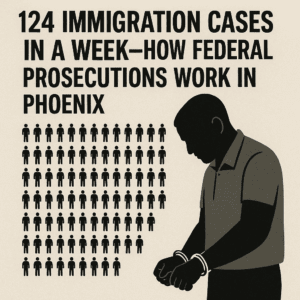In Phoenix, federal prosecutors handle over 124 immigration cases weekly, often targeting illegal entry, re-entry, or document fraud under statutes like §§ 1324, 1325, 1326, and 1546. Cases typically begin with arrests from border interdictions or courthouse detentions, followed by swift procedures like complaints, indictments, and arraignments. Prosecutors often pursue aggressive plea deals or convictions, while defense tactics focus on evidence challenges, constitutional rights, and collateral immigration consequences. Legal expertise, such as that provided by Suzuki Law Offices, is essential to navigate this complex process effectively. For more information, visit Phoenix Criminal Defense Lawyer.
The Phoenix Context: Why 124+ Immigration Cases in a Week Matter
The surge of over 124 immigration-related cases in a single week underscores the intense enforcement environment that dominates Phoenix’s federal system.
As a Phoenix federal immigration defense lawyer, understanding how federal immigration prosecutions work in Phoenix is vital to protecting your clients’ rights.
Prosecutors rapidly process cases stemming from Border Patrol interdictions, ICE arrests, and courthouse detentions, often within days of apprehension.
This high volume indicates a strategic focus on deterrence and enforcement, making early legal intervention indispensable.
Your role involves safeguarding legal rights during this expedited process—during initial appearances, evidence collection, and plea negotiations.
Recognizing the operational tempo helps you advocate effectively, ensuring defendants receive fair treatment amid the aggressive federal crackdown on immigration violations.
Committed to providing exceptional legal service to each and every client through integrity, compassion and experience.
Get StartedCommon Federal Charges Filed in Phoenix: §§ 1324, 1325, 1326, and 1546
Understanding the federal charges commonly filed in Phoenix, such as §§ 1324, 1325, 1326, and 1546, is essential for effective legal strategy.
These statutes address illegal entry, re-entry, alien smuggling, and document fraud, often arising from interdictions, arrests, or court proceedings.
Recognizing how sentencing guidelines impact each charge enables you to protect your clients’ rights better and tailor their defense.
Illegal Entry and Re-entry
Has the persistent enforcement of federal laws targeting illegal entry and re-entry fundamentally reshaped immigration proceedings in Phoenix?
You must recognize that charges under 8 U.S.C. §§ 1325 and 1326 substantially impact defendants caught or caught again entering the country. In the Phoenix federal court, illegal reentry cases often result in swift prosecution, with prosecutors prioritizing these charges due to their enforcement urgency.
Your clients may face enhanced penalties if they’ve prior convictions or a history of illegal re-entry. To advocate effectively, you need precise evidence collection—such as body-cam footage, cell phone data, and border crossing records—and a thorough understanding of the legal standards for illegal entry and re-entry. This approach ensures your clients’ rights are protected at every stage within the federal criminal justice system.
Alien Smuggling Operations
Alien smuggling operations in Phoenix often involve detailed federal charges under 8 U.S.C. §§ 1324, 1325, 1326, and 1546, reflecting the complicated structure of cross-border immigration enforcement.
As an alien smuggling defense attorney in Phoenix, your goal is to navigate the nuances of these statutes—and the severe penalties for immigration crimes in Phoenix federal court—that can include lengthy mandatory sentences and substantial fines.
Charges under § 1324 target smugglers facilitating illegal entry or harboring undocumented individuals.
§ 1325 addresses improper entry, while § 1326 focuses on re-entry after removal.
Additionally, § 1546 involves document fraud related to false or counterfeit immigration documents.
Effective defense strategies demand detailed knowledge of statutory elements, evidence preservation, and careful advocacy to serve clients while protecting their rights amid aggressive federal prosecution efforts.
Document Fraud Cases
Document fraud charges under 18 U.S.C. § 1546 and related statutes frequently arise in Phoenix immigration cases, targeting individuals who submit false or counterfeit immigration documents. These cases, often prosecuted aggressively, involve allegations of knowingly creating, possessing, or presenting fraudulent documents such as visas, work permits, or passports.
In Phoenix immigration defense, it’s crucial to scrutinize evidence like document analysis, surveillance footage, or forensic reports. Prosecutors aim to establish intent and knowledge, making the defense’s role indispensable in challenging the validity and provenance of the documents.
Understanding federal statutes under §§ 1324, 1325, and 1326 is necessary for strategic advocacy. Your goal is to serve your clients by protecting their rights and steering them through intricate legal terrain to mitigate penalties and uphold justice.
Sentencing Guidelines Impact
How do federal sentencing guidelines influence the prosecution and defense strategies in Phoenix’s immigration cases involving charges under §§ 1324, 1325, 1326, and 1546?
You must understand that sentencing guidelines serve as a strategic framework, shaping plea negotiations and potential penalties. Prosecutors use these guidelines to push for charges that maximize sentence severity, while defenses focus on reducing offense levels through mitigation or challenging the application.
In immigration cases, adherence to these guidelines can mean substantial variations in sentences—ranging from probation to decades behind bars. The precise calculation of offense levels, criminal history, and statutory factors impacts client outcomes.
As an advocate, aligning your strategy with the sentencing guidelines guarantees that you effectively serve your clients’ best interests, minimizing collateral consequences and promoting justice.
How a Phoenix Federal Immigration Case Flows: Arrest, Complaint, Indictment, Arraignment
In Phoenix’s federal immigration enforcement process, the case often begins with an arrest, which may occur during Border Patrol interdictions, courthouse detention, or immigration raids.
Once arrested, you’re typically brought before a magistrate for an initial appearance where the arrest is formalized, and rights are explained.
The government then files a complaint outlining the specific charges, such as illegal re-entry or document fraud.
If sufficient evidence exists, a grand jury may issue an indictment, formally charging you with federal offenses.
Your next step is an arraignment, where you’re informed of the charges and prompted to enter a plea.
This process sets the stage for potential detention, bail, or preliminary motions, all driven by strategic considerations to protect your clients’ rights and interests.
Click to contact our personal injury lawyers today
Detention vs. Release: Winning Your Phoenix Bail Hearing
To successfully secure your release at a Phoenix bail hearing, you must demonstrate factors such as community ties, employment, and family connections that outweigh concerns of flight or danger.
Strategic presentation of evidence, including stable residence or ongoing legal compliance, is crucial to influence the decision-makers.
Your ability to craft a compelling argument based on these factors can substantially increase your chances of winning your bail hearing and avoiding detention.
Factors Influencing Bail
When seeking to secure pretrial release in Phoenix immigration cases, understanding the crucial factors that influence bail decisions is vital. Federal bail considerations weigh heavily on whether the court perceives a defendant as a flight risk or danger to the community.
A key factor is your ability to demonstrate that the release won’t jeopardize your immigration status or public safety. Evidence showing strong community ties, employment, or family commitments can favor release, while prior convictions or repeated immigration violations can undermine it.
The court also assesses flight risk based on immigration enforcement priorities, including recent ICE activity.
Your counsel’s task is to present a compelling case that addresses these federal bail considerations, emphasizing your commitment to complying with court orders and protecting your immigration status.
Strategies for Success
Securing a favorable outcome in your Phoenix bail hearing hinges on a strategic presentation that convincingly addresses the court’s concerns about flight risk and community safety. To achieve this, you must demonstrate strong ties to the community, highlight relevant legal defenses—such as challenging unlawful searches in Phoenix immigration cases—and present compelling evidence of your reliability.
Essential elements include:
- Demonstrating a history of compliance and community involvement
- Emphasizing legal defenses like phoenix criminal defense for illegal reentry charge
- Addressing any risks associated with flight or risk to public safety
An experienced advocate understands how to frame these points to persuade the court that release aligns with justice and public interest, especially amidst the heightened enforcement climate. Proper strategy can make all the difference in your bail outcome.
Complete a Free Case Evaluation form now
Evidence Under the Microscope: Stops, Searches, and Suppression in Phoenix
Given the aggressive enforcement environment in Phoenix, law enforcement agencies frequently conduct stops and searches that are subject to intense legal scrutiny.
As a defender, you must focus on evidence under the microscope, scrutinizing the legality of each interaction. Phoenix ICE arrest defense strategies often hinge on challenging the constitutionality of stops, whether based on reasonable suspicion or probable cause.
Legitimacy of search warrants, the use of body cameras, and surveillance footage are vital in evaluating violations of Fourth Amendment rights.
Effectively, you seek to expose procedural irregularities, identify violations of rights, and preserve essential evidence for suppression motions.
Your goal is to protect clients from unjustified searches and secure a fair process, emphasizing the importance of timely, detailed evidence preservation efforts.
Fast-Track, Pleas, and Trial: Choosing the Right Path in the District of Arizona
In the fast-paced District of Arizona, you must carefully consider whether to pursue a swift plea or contest the charges at trial to best serve your client’s interests.
The expedited proceedings demand tactical decisions, balancing the risks of immediate sentencing against the potential benefits of a trial.
Your strategic choice can considerably impact immigration status, sentencing guidelines, and future enforcement actions.
Navigating Speedy Proceedings
Because cases in Phoenix’s federal immigration system move rapidly, you must carefully consider your options for guiding proceedings—whether opting for a fast-track resolution, negotiating a plea, or preparing for trial.
Recognizing the importance of plea bargaining in Phoenix federal immigration cases, you must weigh strategic advantages in securing a reduction or dismissal, while simultaneously protecting immigration status during Phoenix criminal cases.
Key considerations include:
- Urgency of early plea negotiations to manage case timelines
- Evidence preservation to strengthen your client’s position
- Balancing speedy disposition with the need for thorough defense
Your approach should prioritize efficiency without sacrificing just representation, ensuring clients understand the implications of each route and remain committed to serving their best interests within the expedited federal system.
Balancing Plea and Trial
Exploring the decision between a plea and trial in Phoenix’s fast-moving federal immigration system requires careful strategic assessment. You must weigh the benefits of balancing plea and trial options, considering the potential impact on immigration offense sentencing. Pleas can offer certainty, reduced sentences, and streamlined resolution, especially when federal prosecutors push for swift disposition amid high caseloads.
Conversely, a trial may be advantageous if you identify weaknesses in the prosecution’s evidence or if constitutional issues like Fourth and Fifth Amendment violations are at play. Charting this decision involves evaluating evidentiary strength, immigration consequences, and client priorities—particularly the desire to serve others by minimizing collateral harm.
Your goal is to craft a defense aligned with federal charging realities while protecting your client’s long-term interests through a strategic choice.
Sentencing in Phoenix: Guideline Calculations, Departures, and Variances
Sentencing in Phoenix’s federal immigration cases hinges on precise guideline calculations, which often involve intricate adjustments, departures, and variances tailored to specific circumstances. Understanding the sentencing guidelines for immigration offenses in Phoenix is essential for advocating effectively on behalf of clients.
You must scrutinize the base offense level, role adjustments, and relevant enhancements or reductions.
Be alert to:
- Upward or downward departures based on specific case facts
- Variances considering atypical conduct or circumstances
- The impact of prior criminal history and immigration status
An experienced Phoenix federal criminal defense attorney can steer through these elaborate calculations, emphasizing fairness and protecting clients’ rights.
Your strategic knowledge in guideline application highlights your commitment to serving clients by ensuring just and informed sentences.
Protecting Status: Managing Collateral Immigration Consequences in Phoenix
When defending clients in Phoenix’s federal criminal system, it’s essential to recognize that criminal convictions can trigger severe collateral immigration consequences. These consequences often impact a client’s legal status, employment prospects, and long-term residency goals.
With 124 immigration cases charged in the district of Arizona, understanding how convictions influence immigrant status is critical. You must proactively manage these outcomes by identifying potential immigration impacts early and tailoring defense strategies accordingly.
Why choose Suzuki Law for Phoenix immigration defense? Our focus is on safeguarding your client’s right to remain and work in the U.S., ensuring thorough evidence review and strategic advocacy.
Protecting legal status requires detail-oriented defense, awareness of immigration law intricacies, and a commitment to serving clients facing complex federal charges.
Courthouse Arrests in Phoenix: Constitutional Issues and Defense Tactics
Courthouse arrests in Phoenix often involve plainclothes or masked agents detaining individuals immediately after immigration hearings, raising serious constitutional issues under the Fourth and Fifth Amendments.
You should scrutinize these arrests for potential violations of your client’s rights, such as illegal search and seizure or coerced confessions.
Crucial issues include:
- Evaluating whether detention was justified by lawful probable cause or warrants
- Challenging the legality of covert surveillance and evidence collection
- Protecting clients from self-incrimination during questioning
Understanding these constitutional protections enables you to craft effective suppression motions and safeguard your clients’ rights.
Early intervention can substantially impact case outcomes, emphasizing the importance of a strategic defense that upholds constitutional standards and serves your clients’ best interests.
Why Retaining a Phoenix Federal Criminal Defense Lawyer Early Changes Outcomes
Retaining a Phoenix federal criminal defense lawyer early in the process considerably influences case outcomes by allowing your attorney to identify potential constitutional challenges and gather indispensable evidence from the outset. Early intervention ensures indispensable photos, bodycam footage, and phone data are preserved before they are lost or manipulated.
Federal prosecutors leverage swift and aggressive tactics, making timely legal guidance crucial to protect your rights and avoid unnecessary concessions. Your lawyer can also develop an informed strategy aligned with federal sentencing guidelines, maximizing your chances for a favorable outcome.
| Emotional Impact | Legal Consequences |
|---|---|
| Confidence in defenses | Stronger chances of case dismissal |
| Peace of mind | Protecting your constitutional rights |
| Hope for fairness | Reducing penalties or charges |
| Support in adversity | Ensuring strategic case preparation |
| Empowerment | Influencing prosecutorial decisions |
Why Choose Suzuki Law for Phoenix Federal Immigration Defense
Choosing Suzuki Law for your Phoenix federal immigration defense means selecting a firm with proven proficiency in navigating the complexities of federal criminal and immigration law. Our experienced team understands the urgency and difficulties of these cases, ensuring meticulous case evaluation and strategic advocacy.
Suzuki Law offers expert federal criminal and immigration legal representation to protect your rights and interests.
We prioritize evidence preservation—photos, body-cam footage, or legal violations—that could impact your defense. Our attorneys:
- Develop tailored strategies aligned with federal charging priorities and sentencing guidelines*
- Advocate passionately for your rights during negotiations, hearings, and appeals*
- Provide unwavering support to serve your best interests and those of your loved ones*
Frequently Asked Questions
How Does the High Case Volume Impact Defense Strategies?
You need to act swiftly and meticulously, recognizing that the high case volume demands efficient evidence collection and strategic prioritization. Focus on preserving all potentially exculpatory evidence—body cam footage, communication records, location data—while coordinating with clients to build tailored defenses.
Stay vigilant of evolving federal charging patterns and leverage procedural and constitutional challenges, like Fourth and Fifth Amendment rights, to protect clients’ interests amidst an accelerated prosecution climate.
What Rights Do Individuals Have During Immediate ICE Arrests?
During immediate ICE arrests, your rights include remaining silent to prevent self-incrimination and requesting an attorney early on.
You have the right to be informed of the reason for your detention and to refuse consent to searches.
It’s vital to document the circumstances, like officers’ badge numbers and actions, and to assert these rights calmly and clearly, ensuring your legal interests are protected from the outset.
How Can Early Legal Counsel Influence Federal Immigration Charges?
Early legal counsel plays a crucial role in shaping your defense against federal immigration charges. By promptly reviewing evidence, preserving essential data like body-cam footage and phone records, and managing intricate federal sentencing guidelines, your attorney can identify weaknesses, challenge unlawfully obtained evidence, and develop strategic plea or trial options. This proactive approach safeguards your rights, guarantees evidence integrity, and provides the best possible outcome in a fast-moving, high-stakes federal system.
Are There Specific Defenses for Document Fraud and Smuggling?
You can challenge document fraud and smuggling charges by thoroughly examining the evidence, such as verifying the authenticity of documents or establishing rightful possession. Consider questioning law enforcement’s procedures, possible violations of rights, or procedural errors.
Establishing a credible innocence narrative, demonstrating lawful status, or proving lack of knowledge about fraudulent documents can be effective defenses. Your focus should be on protecting your client’s rights while constructively challenging the prosecution’s case.
What Are the Risks of Pleading Guilty in These Rapid-Fire Cases?
Pleading guilty in these rapid cases risks unnecessary conviction, harsh sentencing, and limited legal remedies.
You might forfeit your rights to challenge evidence or arguments that could weaken your case.
A swift plea could also result in receiving a sentence that doesn’t consider your circumstances or potential defenses.
Conclusion
Understanding the surge in immigration prosecutions in Phoenix is vital. Your rights may be at risk during arrests, detentions, or court proceedings, so acting promptly with an experienced federal defense lawyer is indispensable. By grasping how charges are filed, the evidence involved, and your legal options, you can better protect your future. Don’t leave your case to chance—partner with Suzuki Law Offices to steer through this intricate system and secure the most vigorous defense possible.
Call or text (602) 682-5270 or complete a Free Case Evaluation form




